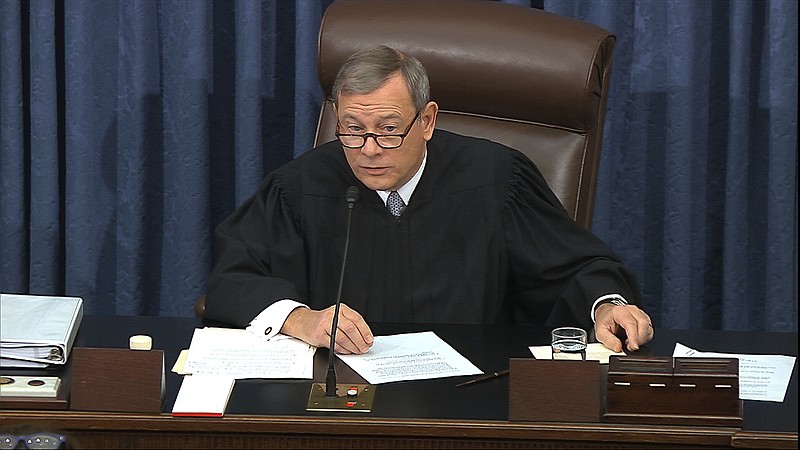"Our long national nightmare is over." - President Gerald Ford
The new president of the United States uttered these words on Aug. 6, 1974, in his inaugural address following the resignation of President Richard Nixon as impeachment articles were being prepared against him in the House of Representatives.
Nixon, despite significant foreign policy achievements, helped orchestrate a massive cover-up of a burglary of the offices of the Democratic National Committee by individuals tied to his re-election committee ahead of a campaign he was almost certain to win easily.
His hubris, his paranoia and his infallibility, leading to acts he committed that fit the Constitution's "high crimes and misdemeanors" standard for impeachment, were his undoing.
Sometime soon, another long national nightmare involving impeachment will conclude. President Donald Trump will be acquitted in a Senate trial that has been a wholly political process, one meant to undo the 2016 election results in which the New York businessman achieved one of the most biggest upset victories in American history.
Since the very night of his election, his Democratic opponents set out to impeach him or otherwise remove him from office.
- "Yes," former federal prosecutor Michael J. Stern wrote in USA Today, "from Day One I wanted Trump impeached. If other Democrats and never-Trump conservatives are being honest, many felt the same way."
- A week before being inaugurated, U.S. Rep. John Lewis, D-Georgia, said he did not plan to forge a relationship with Trump "because I don't see this president-elect as a legitimate president."
- Still prior to Trump being sworn in, U.S. Rep. Jerry Nadler, D-New York, who as House Judiciary Committee chairman later led impeachment hearings and was a House manager in the Senate trial, said "the president-elect, although legally elected, is not legitimate."
- Twenty-seven minutes after being inaugurated, The Washington Post published an article titled "The Campaign To Impeach President Trump Has Begun."
- The first official call for Trump's impeachment was made on the House floor by U.S. Rep. Al Green, D-Texas, on May 17, 2017.
- And, as if to presage the actual impeachment proceedings, U.S. Rep. Adam Schiff, D-California, the House Intelligence Committee chairman and later a House manager in the Senate trial, said in 2018 that "impeachment is, at any given time, what half of the House and two-thirds of the Senate say it is."
In other words, never mind the Constitution, which said there must be a "treason, bribery, or other high crimes and misdemeanors" standard for an impeachable offense.
(MORE: Trump acquittal now likely Wednesday; Senate rejects witnesses)
Democrats were sure Trump had committed one or more of those crimes in a two-year special counsel's investigation about Russian interference in the 2016 election, but the report by Robert Mueller did not give them such satisfaction.
Lacking that, they latched onto a second-hand report by a whistleblower - now believed to be partisan and said to have been in collusion with other Democrats - on a phone call Trump had in July with the new president of Ukraine, to whom he was to have promised delivery of aid for a vow the new president would look into the involvement of a 2020 Trump re-election rival into an already controversial Ukraine energy company.
The facts of the occasion were not as originally alleged, but the president - as this page has said before - acted inappropriately in suggesting the investigation in the phone call. And while improper, his actions did not meet the Constitutional standard for impeachment. No investigation ever was begun into the dealings of Trump's rival, and the aid was delivered.
Nevertheless, on that foundering, purely political ship, with no Republicans joining them in such a critical move, Democrats made their impeachment stand.
Founding Father Alexander Hamilton envisioned the fallacy of such an instance in what became The Federalist [Paper] 65, saying such a process would "agitate the passions of the whole community, and to divide it into parties more or less friendly or inimical to the accused."
The decision to impeach, he wrote, would be "regulated more by the comparative strength of parties, than by the real demonstrations of innocence or guilt."
Retiring Tennessee Sen. Lamar Alexander may have hammered the final spike into the impeachment hearings Thursday night when he said no more witnesses were needed to prove the existence of the phone call, the subtle pressure on Ukraine to investigate and the delay of aid to the country. But the actions, he said, did "not meet the United States Constitution's high bar for an impeachable offense."
(MORE: Read Sen. Lamar Alexander's full statement)
Tennesseans, in a Mason-Dixon poll released Friday, agreed. Fifty-seven percent opposed Trump's removal by the Senate.
This page doesn't always agree with Trump, and we abhor much of his personal behavior, but we do not condone turning impeachment into a political process to get rid of him.
Fortunately, as Ford also said in his inaugural, "Our Constitution works. Our great republic is a government of laws and not of men. Here the people rule."
